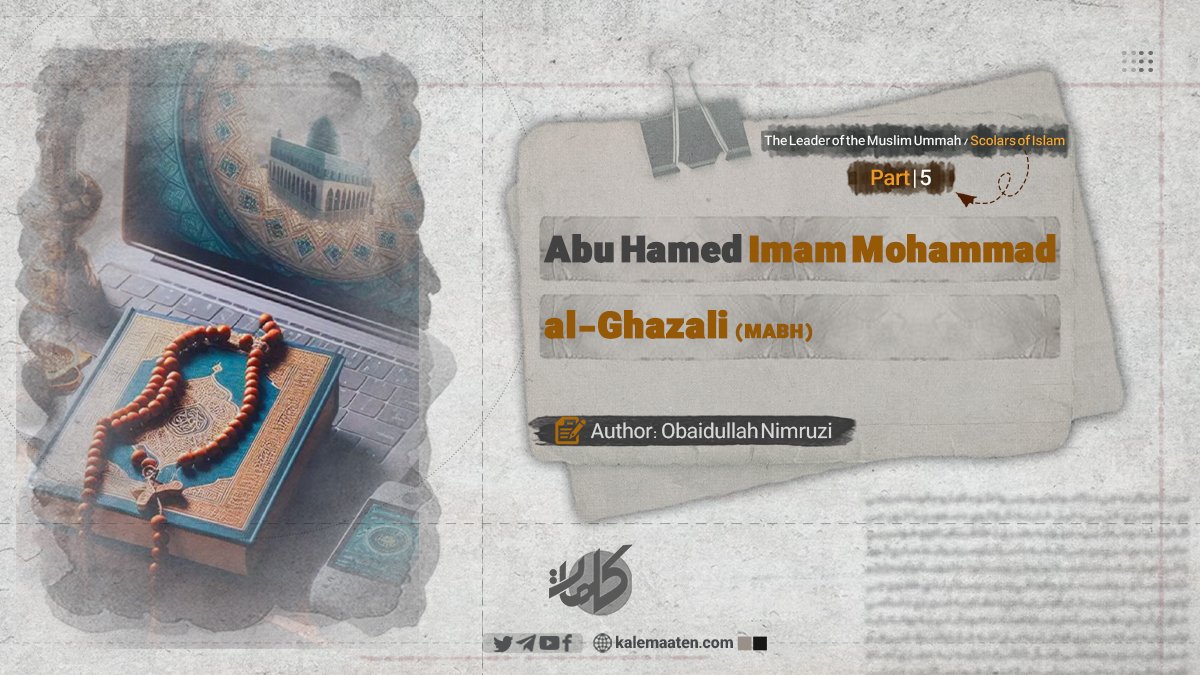
Author: Obaidullah Nimruzi
The Biography of Abu Hamed Imam Mohammad al-Ghazali “MABH” (Part Four)
Conclusion
Comprehensive Transformation in the Life and Thought of Imam al-Ghazali (MABH)
The life of Imam al-Ghazali (MABH), recognized as one of the greatest intellectual and scientific figures of the Islamic world, serves as an inspiring example of personal, scientific, and spiritual development, offering a valuable source of insight for every Muslim and seeker of truth. His journey through various phases of intellectual, scientific, social, and spiritual evolution illustrates the challenges he faced as he transformed from a superficial scholar to a profound religious and mystical thinker.
Family and Education: Laying the Foundation for a Scientific and Religious Path
Imam Ghazali was born into a religious and scholarly family, influential in its cultural and spiritual environment, which guided him toward the pursuit of knowledge and truth. This early foundation highlights the significant role that family and proper upbringing play in shaping great personalities. Imam Ghazali’s education began in his youth, focusing on diverse fields such as jurisprudence, hadith, and philosophy. This comprehensive knowledge proved invaluable in his later life, enabling him to critically analyze and assess various ideas, particularly in philosophy and theology.
Entering the Court of Nizam Al-Mulk and Teaching at the Nizamiyya of Baghdad: Scientific and Political Influence
Imam Ghazali’s entrance into the court of Nizam Al-Mulk and his role as a teacher at the Nizamiyya school in Baghdad showcased not only his academic talents but also his influential presence in the highest scientific and religious circles. During this phase of his life, he gained recognition not only as an esteemed jurist and theologian but also played a pivotal role in shaping the political and social landscape. At that time, the Nizamiyya of Baghdad was renowned as the intellectual hub of the Islamic world. Imam Ghazali’s presence in this esteemed institution underscored his significance in fostering scientific and intellectual advancements.
Imam al-Ghazali’s Intellectual Transformation and Internal Crisis
Concurrently, Imam Ghazali’s presence at the Baghdad Nizamiyya sparked a profound intellectual transformation within him. As he became aware of the intellectual crises and skepticism arising from contemporary philosophical thoughts and rational doubts, he began to question his own beliefs. This intellectual crisis catalyzed a deeper exploration of the essence of religion, philosophy, and theology. What began as skepticism ultimately evolved into a profound quest for deeper understanding and reflection.
Criticism of Philosophy, Theology, and Sufism: Defending Religion and Critiquing Human Sciences
Imam Ghazali adeptly addressed many of the intellectual doubts of his time through his critiques of philosophy and theology. In his seminal work “Tahafat al-Falasifa” (The Incoherence of the Philosophers), he not only offered fundamental critiques of prevailing philosophical perspectives but also introduced a fresh approach to understanding religious truths using both reason and divine revelation. His critiques of theology were notable because he did not view theology simply as a tool for expressing religious truth; instead, he critiqued it for its focus on abstract and unproductive discussions.
Imam Ghazali also examined Sufism from a unique lens. While he critiqued certain batinī (esoteric) ideas and some Sufis who deviated from the path of truth, he presented genuine and mystical Sufism as a means to attain truth and divine knowledge. In essence, Imam Ghazali built a bridge between the realms of science and Sufism, encouraging the pursuit of true knowledge.
Migration from Baghdad and Inner Transformation: From Seclusion to Prosperity
Imam Ghazali’s migration from Baghdad marked one of the greatest transformations of his life and had a profound impact on his thoughts and actions. He spent ten years in seclusion and solitude away from worldly affairs, searching for inner truth and divine knowledge. During this time, he engaged in self-improvement and spiritual training, ultimately attaining a level of certainty and insight. This solitude provided him the opportunity to shed doubts and uncertainties, allowing him to approach scientific and religious matters with a clear mind and heart.
However, Allah Almighty had a different destiny in store for Imam al-Ghazali. He was called back from solitude to help save Islamic society from skepticism and intellectual deviations. His decision to return to the social realm and embark on a new mission in Nishabour signified his commitment to addressing the intellectual and religious challenges of his era. This return was not merely a physical one; it represented a revival of science and religion in response to the intellectual crises of the time.
Return to the Social Scene and Its Impact on Society
Imam Ghazali’s returns to teaching in Nishapur and at the Nizamiyya schools marked a pivotal moment in the history of religious scholarship in the Islamic world. He effectively dispelled many doubts and profoundly influenced societal thought by articulating the truths he discovered during his solitude. The changes Imam Ghazali enacted in his scientific perspective reflected a transition from superficial thinking to a deeper comprehension of religious and rational knowledge. He maintained that true science is that which draws individuals closer to Allah and steers them away from selfishness and ignorance.
Final Conclusion:
Imam Ghazali’s Teachings for the Present Era
The biography of Imam Ghazali (MABH), especially regarding science and religion, philosophy and Sufism, and their interrelationship, serves as a comprehensive guide for those pursuing a profound understanding of the truth. His works continue to stand as reliable sources for Muslims in contemporary society. Imam Ghazali exemplifies an ideal role model, not only for his own time but also in any era when humanity seeks to uncover the truth and confront intellectual challenges.
Imam Ghazali’s life and thought teach us that in the search for truth, one must always be diligent and, at each stage of life, transition from knowledge to mystical understanding and from action to divine insight. Only through this journey can one attain a deeper understanding of their existence and the world around them and be guided toward the righteous path.
Continues…


